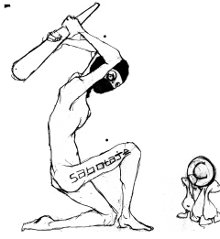This year Info Free Flow‘s hank has unravelled through various interdisciplinary moments: as a miniature social network, this time an "analogical" one, heterogeneous tools were employed for a comparate examination of our technological milieu, tagging diversely from time to time the phenomena which interest us, and from which we are interested, and socializing them with others. In other words, by doing networking.
Networking means gathering heterogeneous experiences, reprocessing one’s acknowledgements in the light of others’ contributions and self-building physical, digital and mental frames appropriate to help progressing the exchange of ideas.
However, this is not enough. Crossing the main themes of last years’ computer science debate, a critique of the networking tool becomes appropriate in regard to a serie of its fruition nodes: what communicate and what not (privacy), by which means that can be achieved (web 2.0 rather than darknets), how to ensure data and profiles portability, which usage will be made of them (licence of appropriation of the transmitted information/knowledge by third parties and profiling).
However, two are the fields that define the type of network we are going to criticize; that is, the network infrastructure and hardware and the range of users that relate themselves to it with their own practices.In advanced capitalist societies, with the exceptions of pockets of digital divide in which there is no convenient investment for privates and the public is lacking, the network connection infrastructures progress and their subscription costs decrease: the capital’s strategy is to include into the market the widest possible range of users, to raise profits connected to the long tails. For this purpose, the web is favourite as advertising media, since traditional ones such as newspapers, radios, tvs and door-to-door sales are unable to feature such specifical ads as Google’s AdSenses, in regard to new consumers’ requests.
Specularly to this economical interest, very keen to expand and extend itself, capabilities of networks’ liberatory usage were long perplexed. Referring to wireless technology, for a long time manufacturers of these devices did not release drivers’ sources, repressing chances of their modding and customization by users.
In front of this merely functional use of the wireless medium, envisaged by the thousand limits and restrictions of public laws and private contracts, the challenge is that of promoting the attitude of experimenting, testing, playing with this technology and design alternative uses for it, in order to satisfy needs and desires and re-appropriate oneself of income inasmuch as grassroots technologies become able to replace or enhance the costly pre-packaged devices that monopolize the market.
Other themes highlighted by the exponential growth of web technology and the number of entities that are interfaced with it are those of privacy, anonimity and techno-control. In the last five years, the boost of data’s transmission speed and storage capacity made feasible a diffusion of information in high quantity and quality, far cry from before.
Techno-control is born when is made possible on a large scale their association with physical subjects, that by then are turned into digital subjects.
The digital subject configures itself in turn as an everchanging nexus of informational flows, which unintentional dissemination – operated by movement and making of transactions inside and outside the web – rises concern about their monitoring and usage by third parties, and need to protect them with appropriate habits and technologies.
The projection on the web that individuals and collectives make of themselves, by inserting – not just willingly, but even in detail – their personal data on social networks such as Myspace, Youtube, Flickr and Facebook results in publication and categorization of preferences, tendencies, projects and agendas.
If from one side these frames represent a source of opportunities of communication, networking and collective consciousness building, that does not come for free: personal and collective data hold an intrinsic value that is embezzled from time to time by commercial profiling, using users’ aggregated consumption preferences in order to sell them the lastest gimmick on the market, to provide with information on them he who should decide about their compatibility with some job, or by further fueling statal techno-control’s pervasive machine.
Not anymore (or better, not only) then an archetypal orwellian big brother, monolithical, statal and repressive but a variable geometry of big brothers, each one owning one or more closed databases of information about millions of profiles that, starting from a captivating model of consumism of relationships, by defining the coordinates resulting from the crossing of their data can point one’s location – on the cyberspace’s map and beyond – with absolute precision.
A determination which tastes deterministic by the time in which, followed by appropriate means of conditioning such as targeted advertising and subtle inculcation of socio-cultural stereotypes into an individual, favours conformation in his consumptions and relationships until their complete predictability, a condition that casts man’s evolution and saddens his existence. Control through utmost transparence.
Against this, self-formation about personal data management acquires a central value; then turning viable a tactical and contingent usage of mainstream social networks, with the chance of starting, crossing and building in parallel and perspective – also thanks to free software – digital unmercified spaces, platforms keen about data portability and communicational channels more respectful of privacy, such as proxies and decentralised networks.


Ultimi commenti